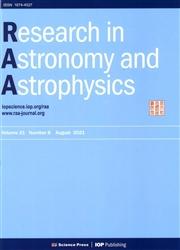The Metallicity Dimension of the Super Earth-cold Jupiter Correlation
IF 2.8
4区 物理与天体物理
Q3 ASTRONOMY & ASTROPHYSICS
引用次数: 0
Abstract
The correlation between close-in super Earths and distant cold Jupiters in planetary systems has important implications for their formation and evolution. Contrary to some earlier findings, a recent study conducted by Bonomo et al. suggests that the occurrence of cold Jupiter companions is not excessive in super-Earth systems. Here we show that this discrepancy can be seen as a Simpson’s paradox and is resolved once the metallicity dependence of the super-Earth–cold Jupiter relation is taken into account. A common feature is noticed that almost all the cold Jupiter detections with inner super-Earth companions are found around metal-rich stars. Focusing on the Sun-like hosts with super-solar metallicities, we show that the frequency of cold Jupiters conditioned on the presence of inner super Earths is超地球-冷木星相关性的金属性维度
行星系中近距离超级地球和远距离冷木星之间的相关性对它们的形成和演化有着重要的影响。与之前的一些发现相反,Bonomo 等人最近的一项研究表明,在超地星系统中,冷木星伴星的出现并不过多。在这里,我们表明这种差异可以被看作是辛普森悖论,一旦考虑到超地星与冷木星关系的金属性依赖性,这种差异就会得到解决。我们注意到一个共同的特点,即几乎所有与内超地伴星有关的冷木星探测结果都是在富金属恒星周围发现的。我们重点研究了具有超太阳金属性的类太阳宿主,结果表明以内部超地球的存在为条件的冷木星频率为 39-11+12%,而在相同金属性范围内冷木星的频率不超过 20%。因此,在富金属宿主周围,近邻超级地球和远邻冷木星的出现似乎是相关的。由于样本量有限,冷木星的出现率也低得多,因此对于金属贫乏宿主的恒星来说,这两类行星之间的关系还不清楚,但不能排除两者之间存在相关性。
本文章由计算机程序翻译,如有差异,请以英文原文为准。
求助全文
约1分钟内获得全文
求助全文
来源期刊

Research in Astronomy and Astrophysics
地学天文-天文与天体物理
CiteScore
3.20
自引率
16.70%
发文量
2599
审稿时长
6.0 months
期刊介绍:
Research in Astronomy and Astrophysics (RAA) is an international journal publishing original research papers and reviews across all branches of astronomy and astrophysics, with a particular interest in the following topics:
-large-scale structure of universe formation and evolution of galaxies-
high-energy and cataclysmic processes in astrophysics-
formation and evolution of stars-
astrogeodynamics-
solar magnetic activity and heliogeospace environments-
dynamics of celestial bodies in the solar system and artificial bodies-
space observation and exploration-
new astronomical techniques and methods
 求助内容:
求助内容: 应助结果提醒方式:
应助结果提醒方式:


